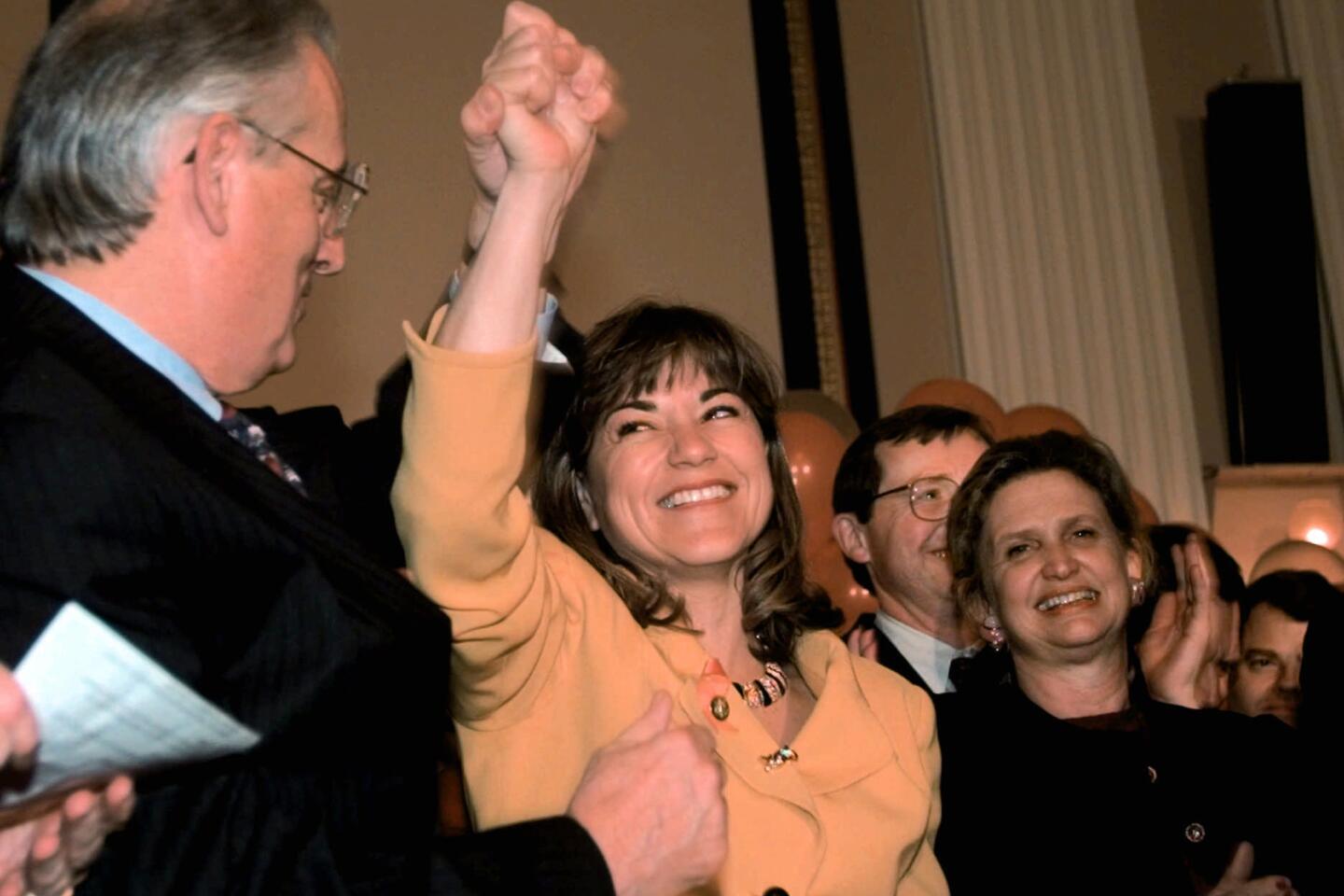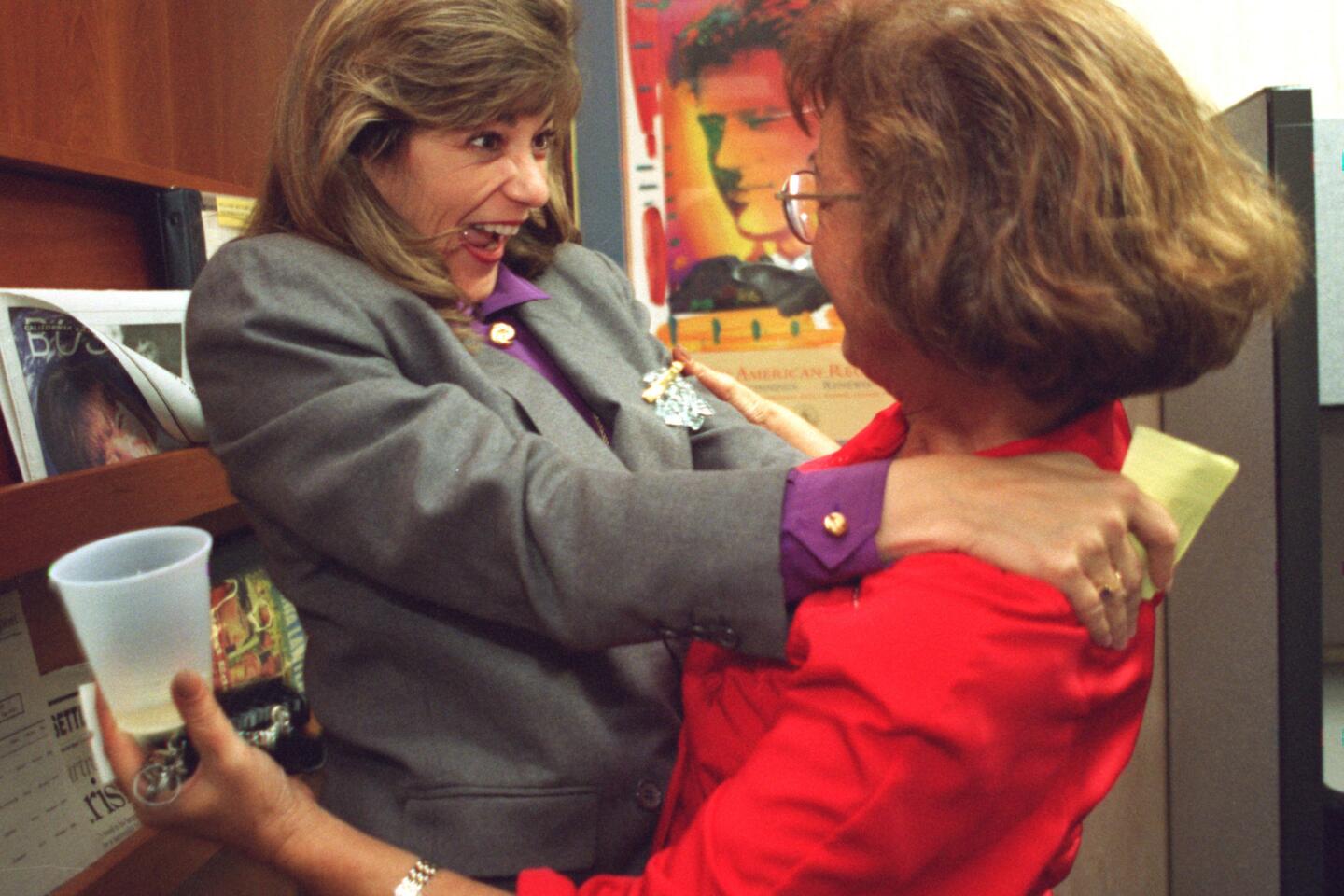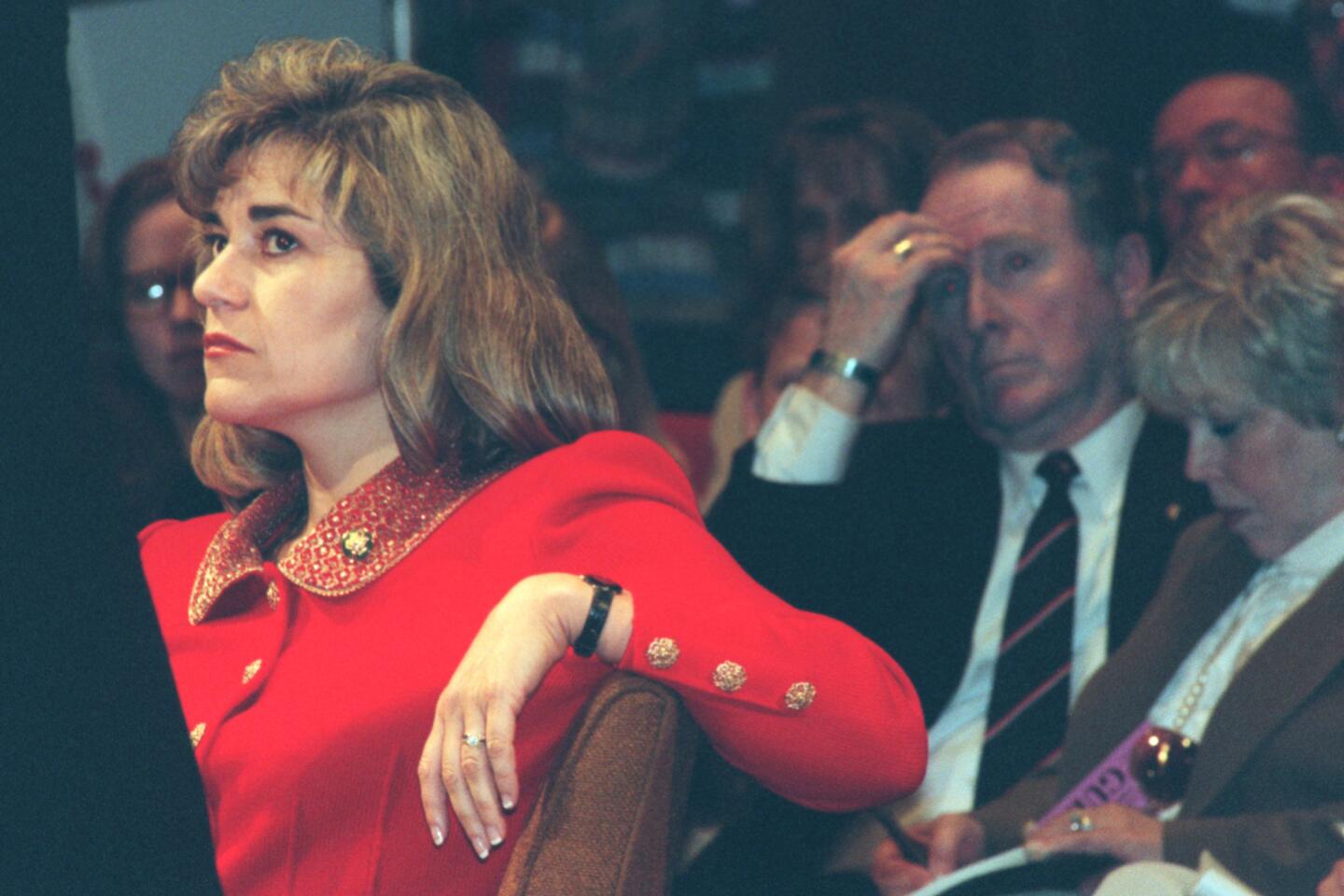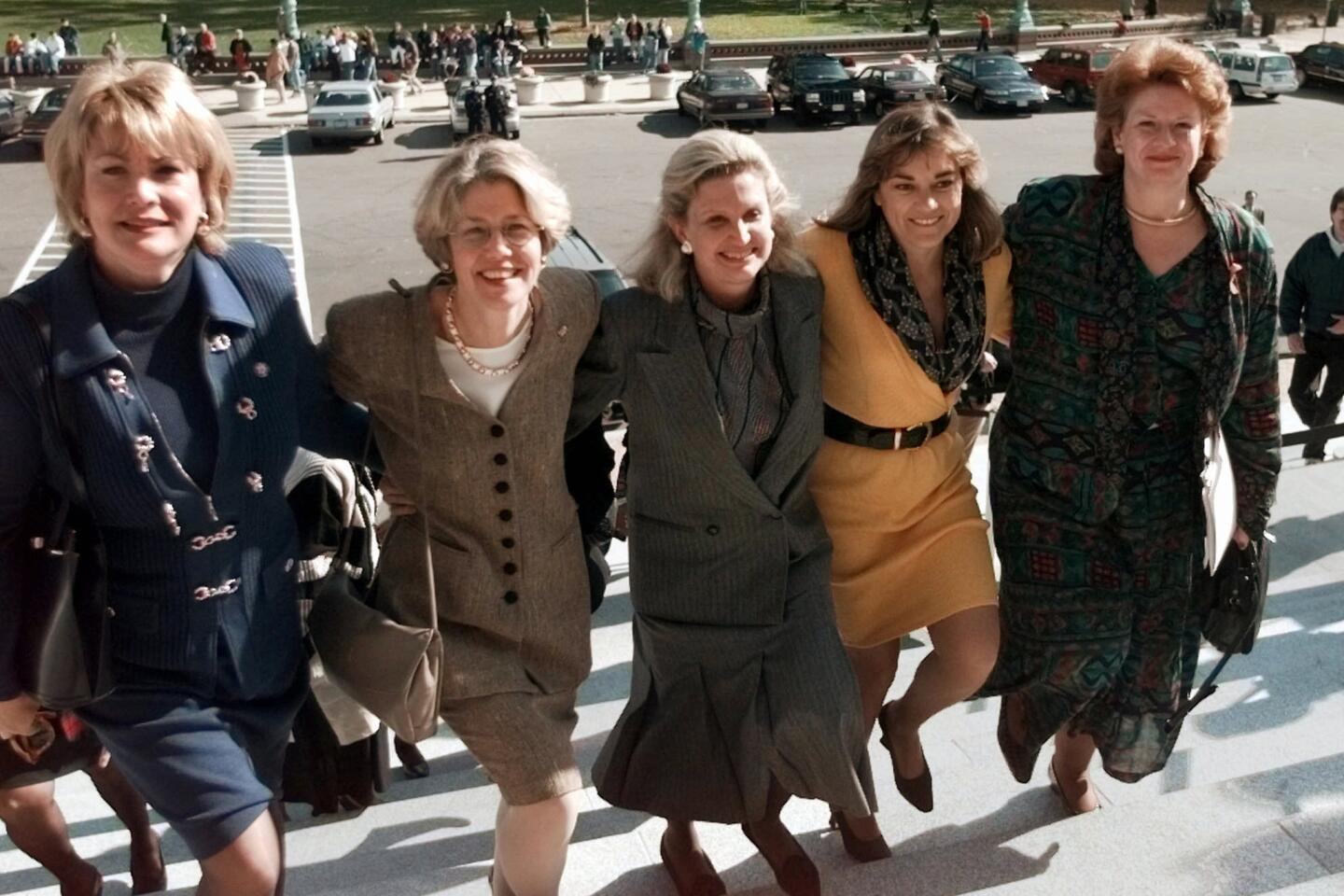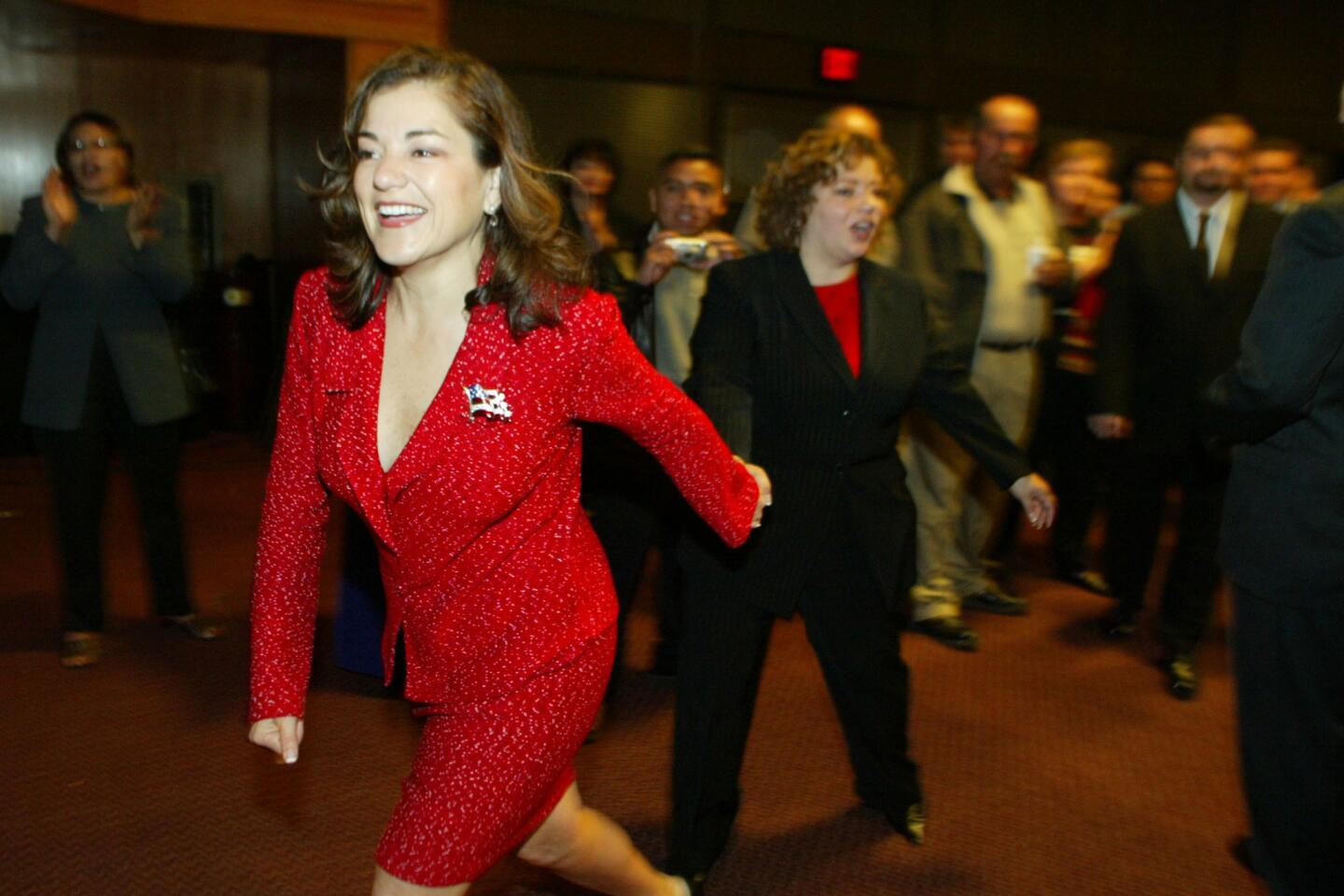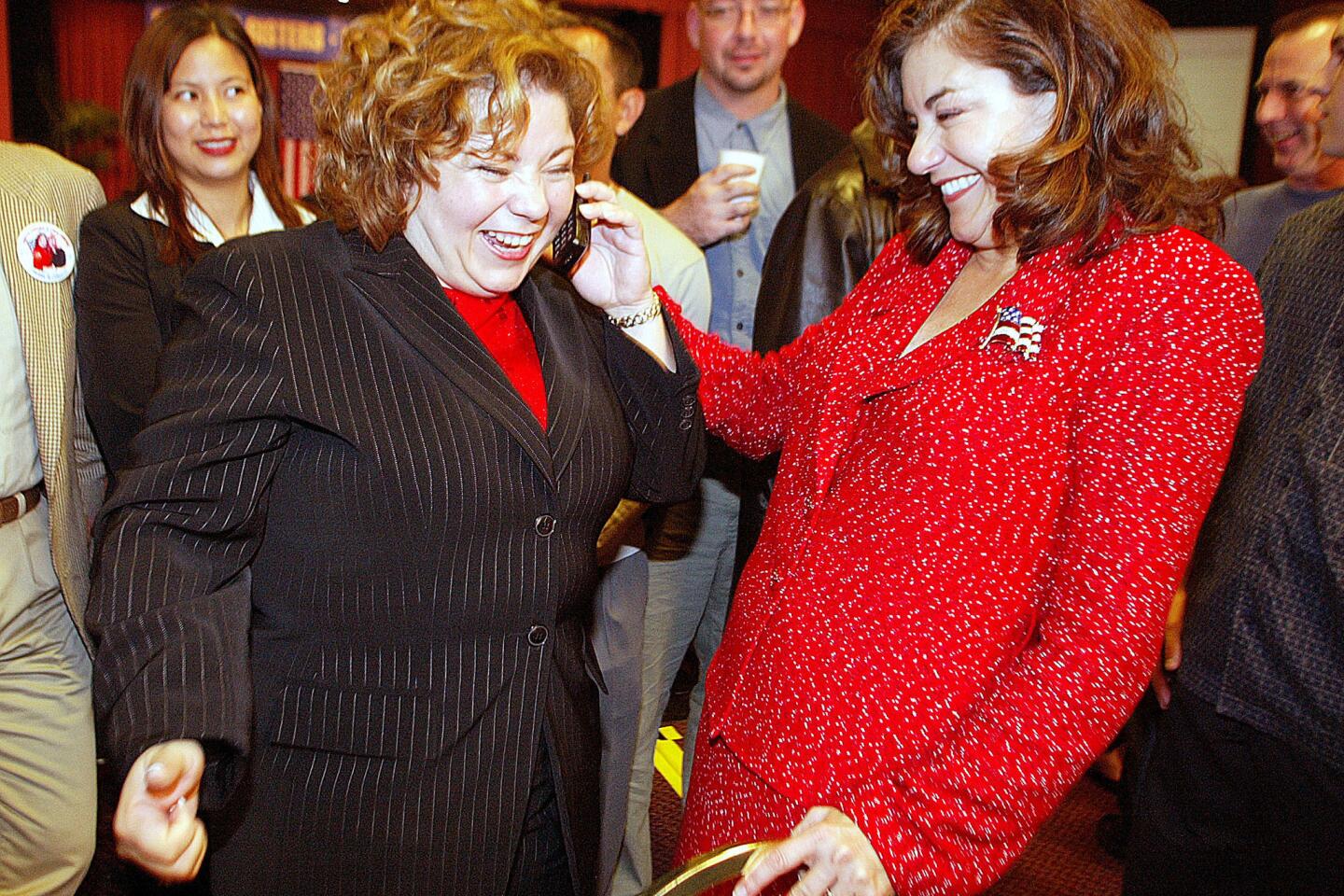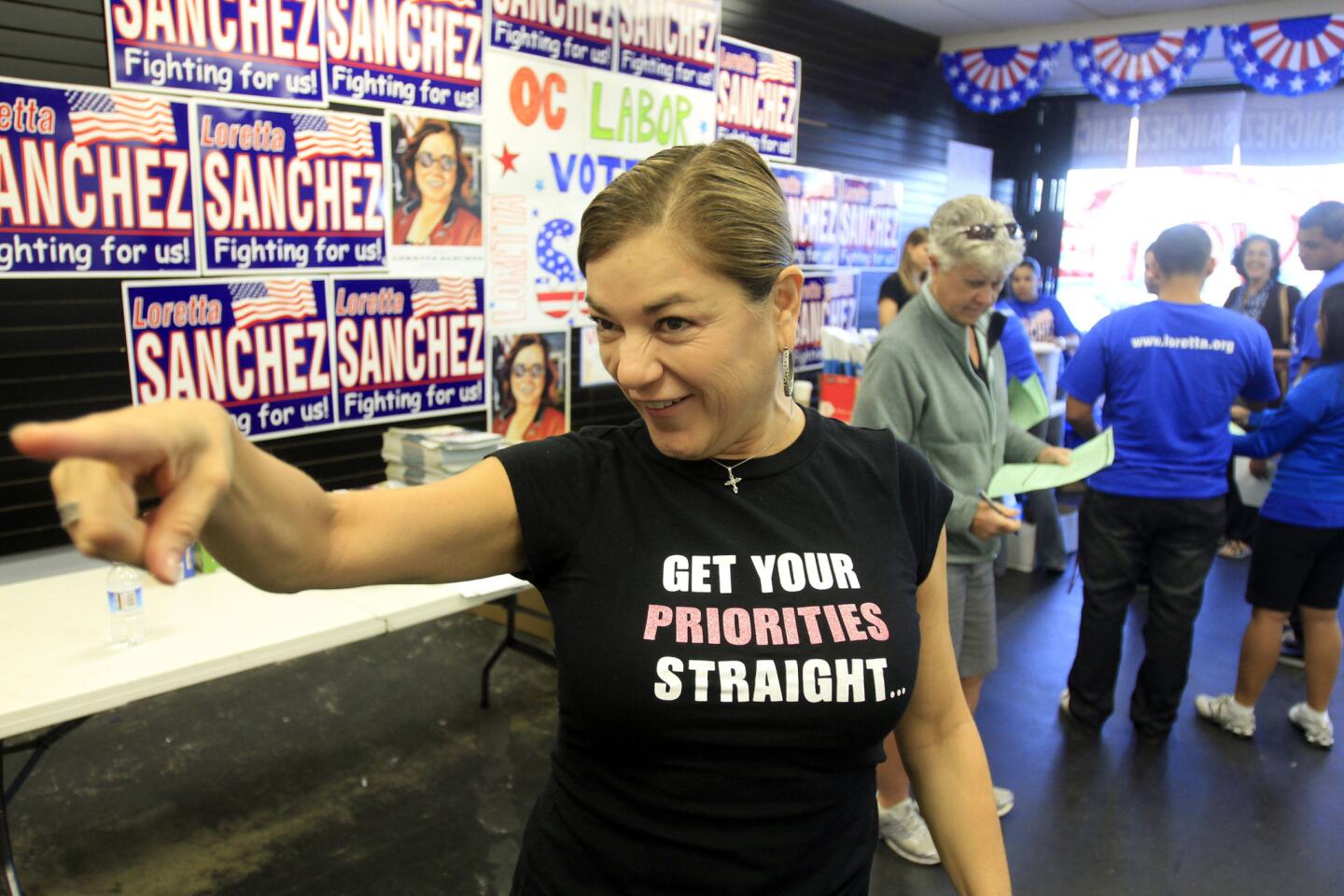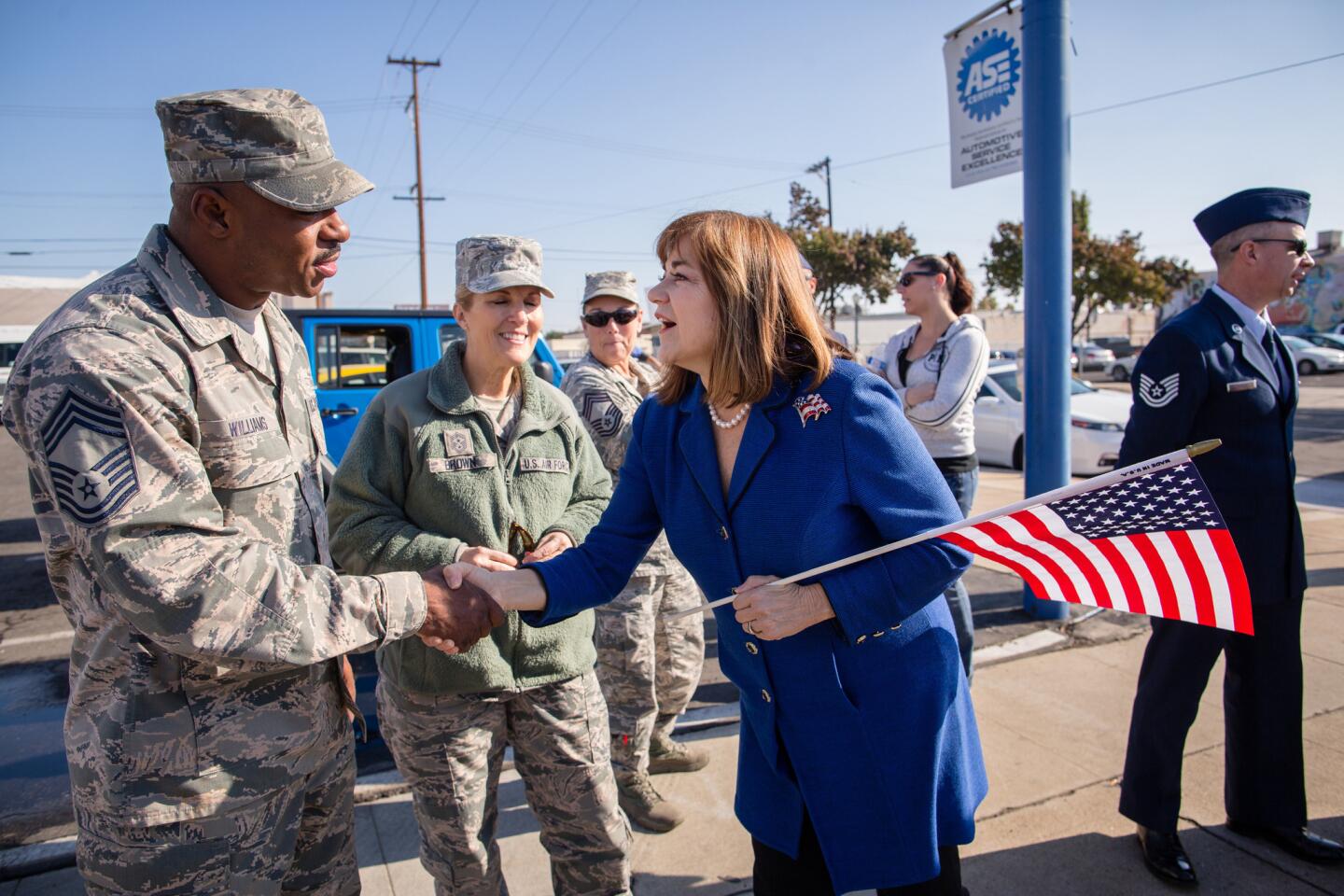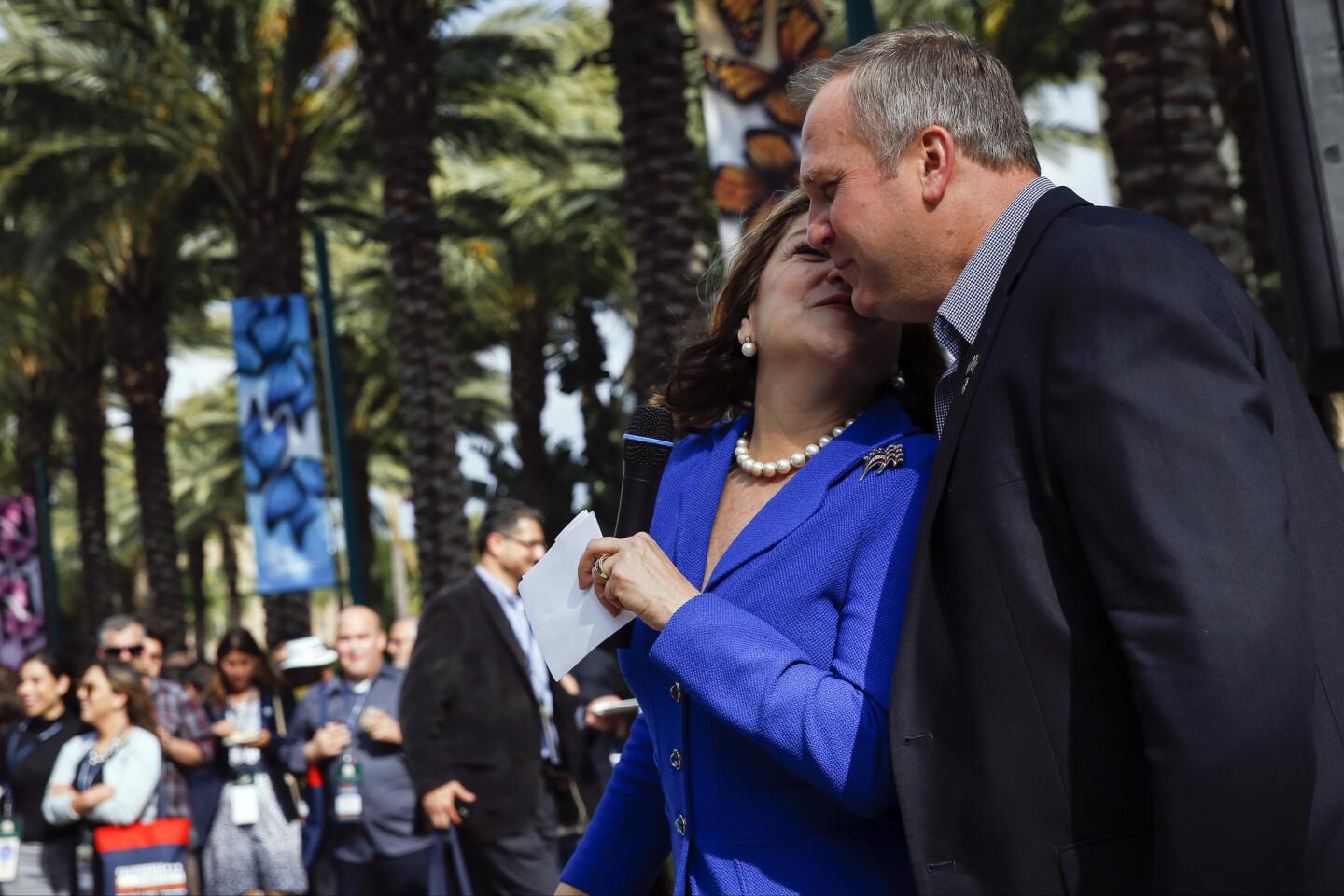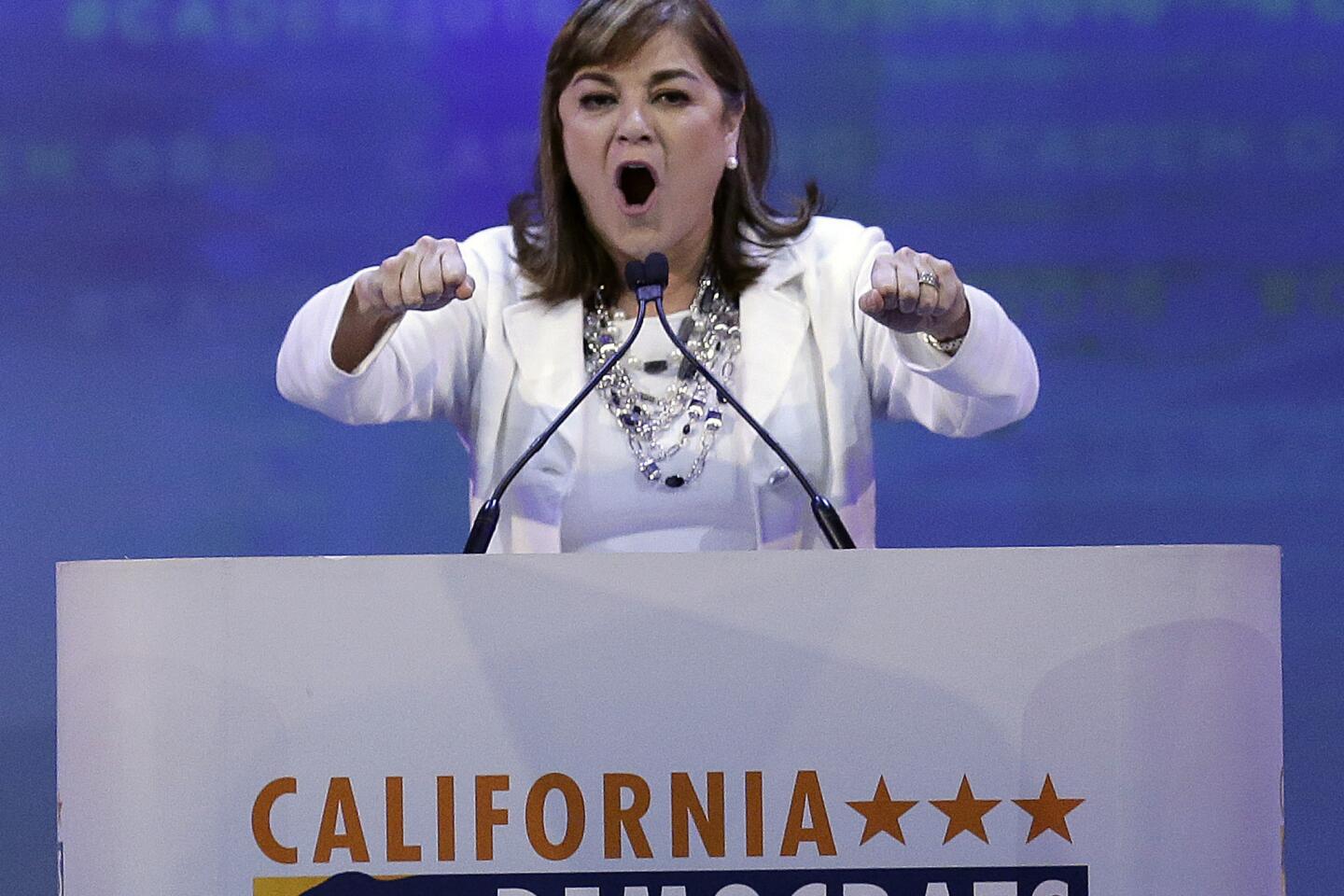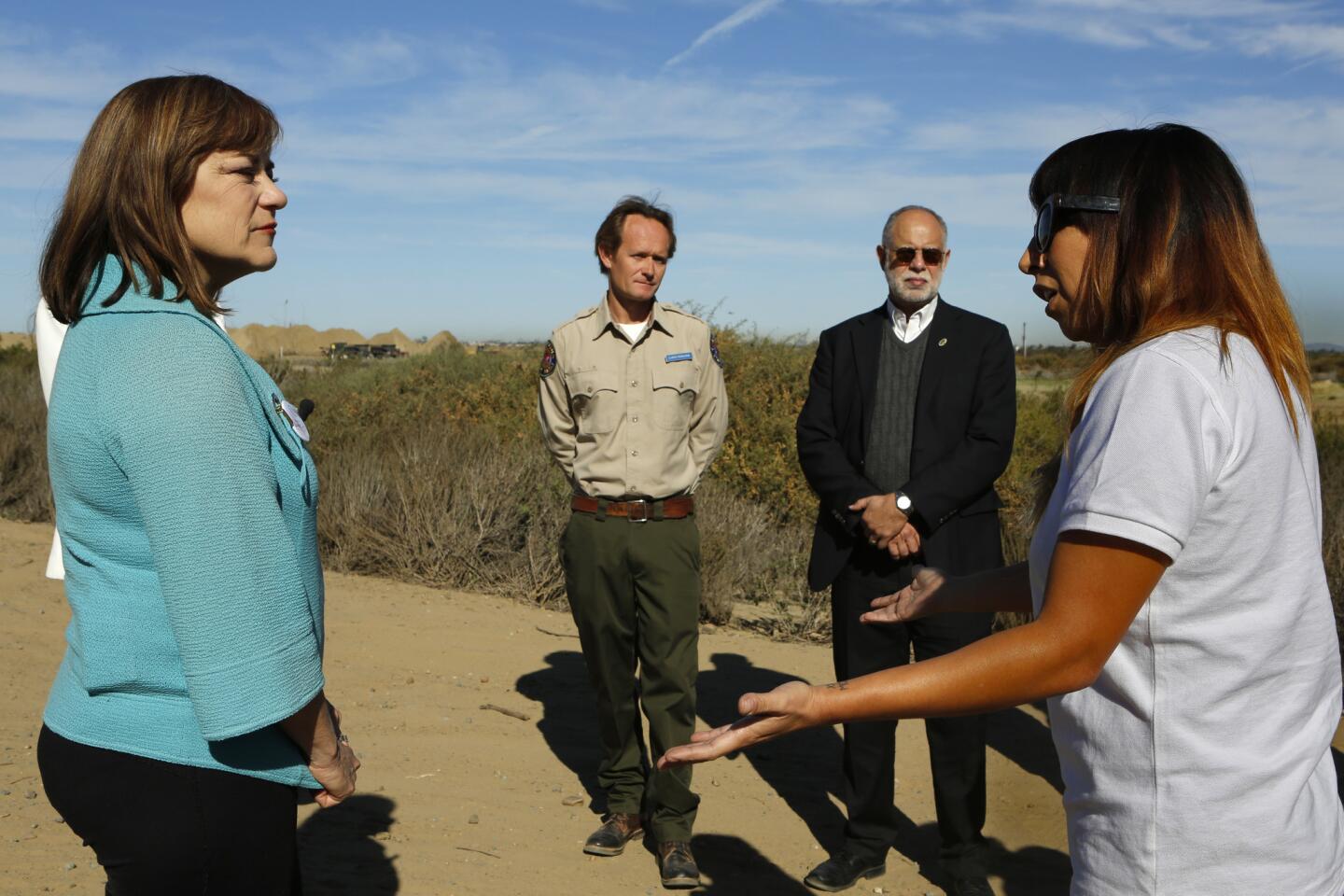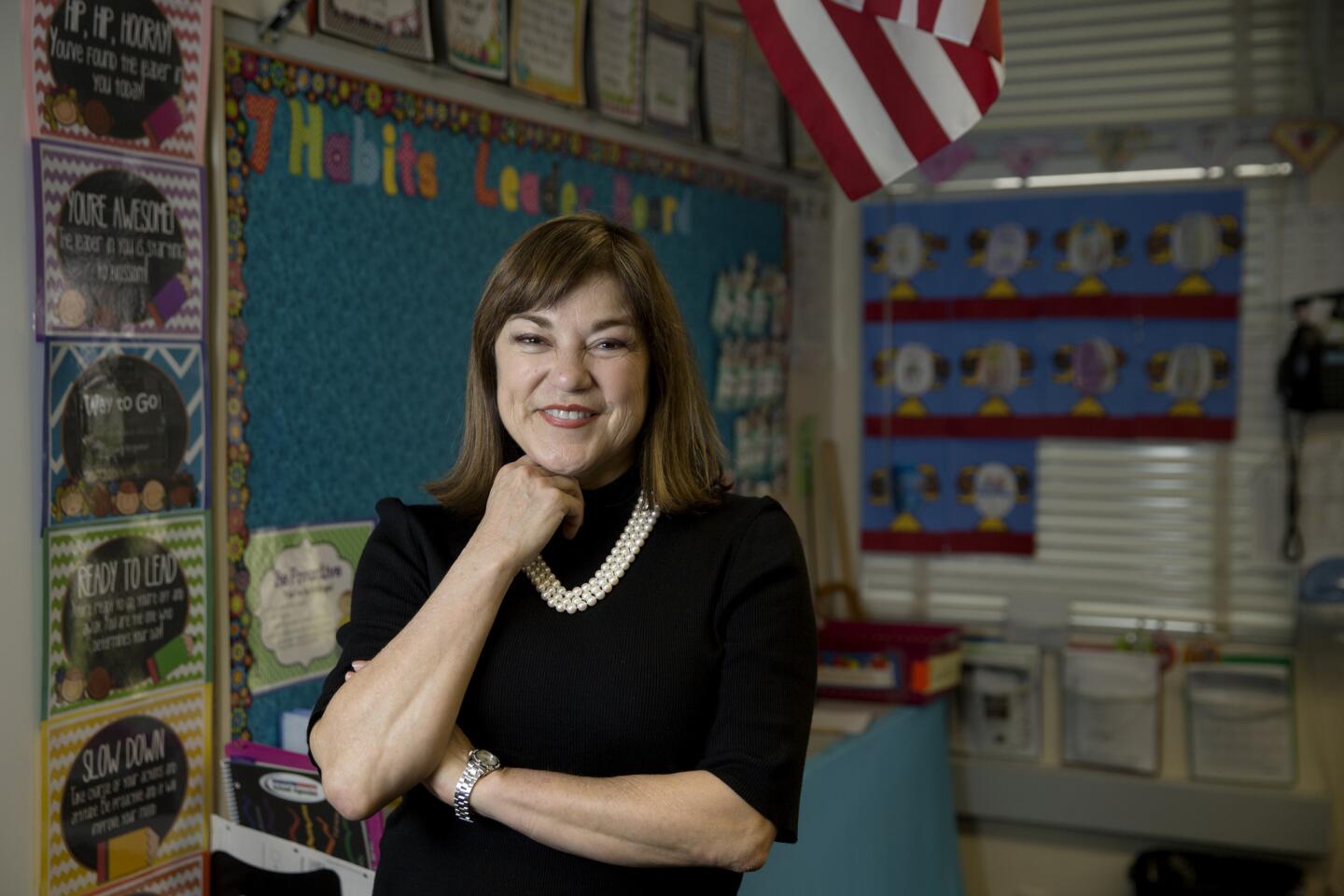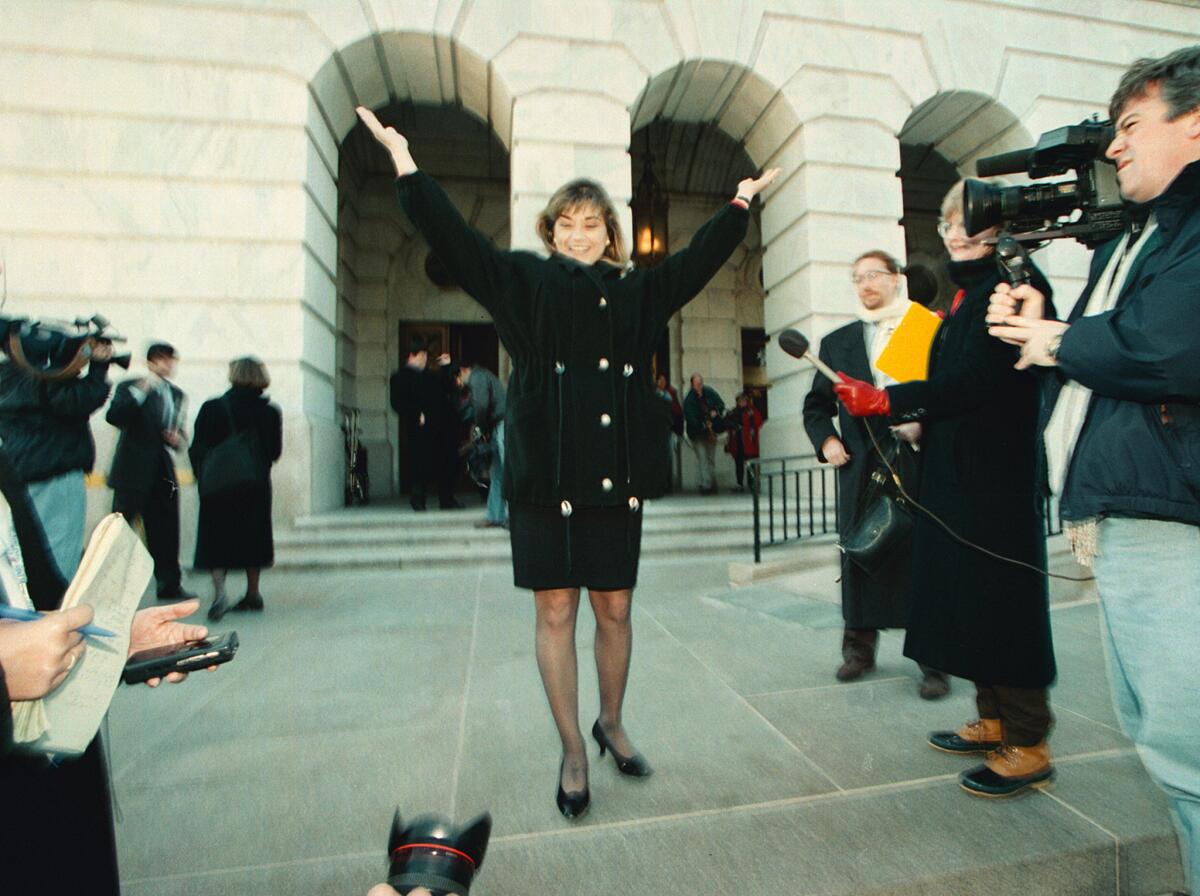
Rep. Loretta Sanchez gestures on the steps of a congressional office building in Washington during orientation week for new members of Congress.
Rep. Loretta Sanchez’s easygoing, neighborly style has won over Orange County voters for two decades, but that blessing has come with a nettlesome curse: the occasional, stinging political gaffe.
Since jumping into the U.S. Senate race last spring, Sanchez has found herself receiving negative attention for imitating a Native American “war cry” — which was caught on video — and for suggesting that 5% to 20% of Muslims support a caliphate.
Even the launch of her campaign was flubbed when a “draft” announcement was leaked to reporters days before she was ready.
Sanchez’s missteps have drawn snickers from her opponents in the race to replace four-term Democratic Sen. Barbara Boxer, who is retiring at 75. But past rivals warn against discounting her. They say the Democrat has a history of defying low expectations, and Sanchez’s 10 straight congressional victories in a county known as a bulwark of rock-ribbed conservatism is evidence of her tenacity and deft political skills.
“It’s easy, based on Loretta’s colorful actions and gaffes, to dismiss her right off the bat. But she is actually an aggressive and smart campaigner,” said George Andrews, who managed Republican Van Tran’s unsuccessful 2010 campaign to unseat Sanchez in one of her toughest reelection challenges.
For Sanchez, 56, facing long odds is nothing new.
In 1996, the little-known financial analyst from Anaheim earned the nickname “Dragon Slayer” after ousting archconservative Rep. Robert “B-1 Bob” Dornan, beating him by just 984 votes. She survived a bitter fight with Dornan as he attempted to overturn the results by claiming the election was tainted by illegal ballots cast by noncitizens.
Before that, her political resume consisted solely of a failed bid for the Anaheim City Council.
“When she first ran, she was not expected to be the nominee, not even by the Democratic Party,” said Los Angeles-based political consultant John Shallman, who managed Sanchez’s 1996 campaign. “And when she was the nominee, they didn’t believe she had a chance. Why? Because she was Latino and a woman.”
Born to parents who immigrated to Los Angeles from Sonora, Mexico, Sanchez remembers being one of the first enrollees in Operation Head Start, a federal program for low-income children, at her El Monte elementary school.
Her parents met while working in an L.A. rubber and plastics factory, where her father was a union machinist and her mother a bookkeeper.
When the Sanchez family moved to Anaheim in 1965 and joined just a handful of other Latino families in the neighborhood, both next-door neighbors put their homes up for sale, Sanchez recalled.
Sanchez was the second of seven children, and her parents pushed them to focus on math and science — anything less than a straight-A report card spelled trouble. All went on to earn college degrees. “My dad told me, ‘I never want anyone to call you a dumb Mexican,’” Sanchez said.
Sanchez married retired Army prosecutor Col. Jack Einwechter in 2011. At the time, he was working as a Washington lobbyist; he’s now a practicing attorney in Orange County. (Sanchez divorced her first husband, Stephen Brixey, in 2004.)
Einwechter said he had been a longtime registered Republican and voted for Ronald Reagan in the 1980 presidential election. Now, he said, he is a dedicated “Lorettacrat.”
Sanchez said she registered as a Republican when she was a senior at Katella High School in Anaheim on the advice of her civics teacher, a liberal, who told her that voting for Democrats in conservative Orange County guaranteed a life of crushing disappointment. But Sanchez changed her mind abruptly in the early 1990s, a period of political awakening for many California Latinos, when she heard GOP presidential hopeful Pat Buchanan unleash brimstone-laced diatribes about the “illegal invasion” of Mexican immigrants crossing into the U.S., bringing drugs and stealing American jobs.
Kamala Harris is much more careful and controlled. Loretta is kind of out there.
— Raphael Sonenshein, director of the Pat Brown Institute of Public Affairs at Cal State Los Angeles
“My parents are immigrants,” Sanchez recalled thinking at the time. “I said to myself, you know what. I don’t think I’m a Republican.”
Sanchez’s political transformation, in many ways, coincided with a wave of Californians, especially Latinos, moving away from the Republican Party.
But the growth of the Democratic Party in the state offers her no guarantee of success in her current campaign. Her biggest rival is state Atty. Gen. Kamala Harris, a fellow party member who remains comfortably ahead in the polls and fundraising with less than two months until the primary. A recent USC Dornsife/Los Angeles Times survey found Harris leading Sanchez 28% to 19%, with Republican hopefuls in single digits and 32% of California voters undecided.
California has not had an open Senate seat since 1992. The top two finishers in the June 7 primary election, regardless of party, will face off in the November election. Sen. Dianne Feinstein will be up for reelection in 2018.
In the two decades that Sanchez has represented central Orange County, she has been praised and pilloried, viewed at times as a national defense expert, masterful fundraiser and sage political mentor — but also a legislative lightweight and a gaffe-prone wild card.
Washingtonian magazine in 2006 labeled Sanchez as “no altar boy/girl.”
Last May CQ-Roll Call named her among the “debate shapers and swing votes” on its list of the “25 most influential women in Congress.”
She has won accolades for voting against the Iraq War resolution and the Patriot Act at a time when Washington was under intense political pressure to respond after the Sept. 11, 2001, terrorist attacks.
She is the second-ranking Democrat on the House Armed Services and Homeland Security committees, is well-versed in global security issues and considered a vocal advocate for women in the military.
But she has drawn scorn for her carefree manner, including her tradition of sending flamboyant Christmas cards and for a later-scuttled proposal to throw a party at the Playboy Mansion during the Democratic National Convention in 2000. (Playboy magazine founder Hugh Hefner has contributed more than $35,000 to her campaigns.)
In December, she was criticized by Muslim American organizations and the Harris campaign for saying that between 5% and 20% of Muslims support the establishment of a strict Islamic state. She later suggested she had gotten the fact from a book.
“She’s a bit of a maverick, very feisty, and has sometimes crossed swords with people in her party,” said Raphael Sonenshein, director of the Pat Brown Institute of Public Affairs at Cal State Los Angeles. “Kamala Harris is much more careful and controlled. Loretta is kind of out there.”
That reputation travels with her, but supporters also believe Sanchez’s long history of helping other Democratic candidates, in California and across the nation, has helped salve any political wounds.
Among the beneficiaries has been her younger sister Linda, a former labor organizer from Whittier, who was elected to the House in 2002 — making the duo the only sisters in history to serve together in Congress.
She also is credited with helping fellow Orange County Democrats Lou Correa and Joe Dunn get elected to the state Legislature — now the two are running against each other to replace her in Congress.
On the campaign trail, Sanchez emphasizes her national security experience, saying that over two decades she has developed an expertise in nuclear proliferation and has met with American combat troops and officers in Iraq.
She warns that it would be a mistake to send a novice to the Senate during such perilous, complicated times — a not-too-subtle dig at Harris and the top Republicans in the race.
“This is too important a state, and too important a position for someone to get on-the-job training,” she said.
As a member of the Armed Services Committee, she has pushed efforts to protect members of the military from sexual assaults as well as decrease the size of the nuclear arsenal, and questioned wasteful military spending.
“Her legacy is being a really tough critic on procurement problems,” said Rep. Adam Smith of Washington state, the only Democrat who outranks her on the committee. “She’s strong on national security. But she wants the money spent well.”
Sanchez lacks the type of signature bill that members of Congress aspire to write, even though her party held power for four years of her 20-year tenure.
She has made a mark, though, as a cautious voice on foreign military engagement and in pushing for greater human rights in Vietnam and other countries.
A review of Sanchez’s attendance shows she missed 13 of 18 Homeland Security meetings from January through early November, tied for the second-worst attendance on the committee. She missed the vast majority of her subcommittee meetings and half the full meetings in the 2013-14 congressional term, when she was not yet running for higher office.
Last year, Sanchez was supposed to co-chair a task force on obstructing terrorist travel and keeping violent extremists from entering the United States.
But two Republicans on the eight-member panel, who said they attended most of at least 16 meetings and briefings over seven months, said they never saw Sanchez there. Democrats serving on the Homeland Security Committee, from which the task force was created, said attendance was not recorded at the private meetings.
Sanchez could not cite any meetings she attended, but said she thought she had attended some.
“I attended the vast majority of them … I did not see her there,” said freshman Rep. Martha McSally (R-Ariz.), a retired Air Force colonel.
Sanchez has also missed more floor votes in the House — more than one in five — than all but two other members in 2015, according to Congressional Quarterly. That’s a drop from her previous terms in Congress, when she cast votes more than 90% of the time in all but one year.
Sanchez said she doesn’t recall missing many Homeland Security hearings, but added that her responsibilities on the Armed Services committee this year expanded greatly when Smith, the ranking Democrat, was away from Congress because of two hip surgeries.
Sanchez said she also spent more time in California, in part because her father has Alzheimer’s and her elderly mother, though still independent, also needs more care.
On domestic issues, Sanchez has tried to cultivate a moderate image, joining a group called the “Blue Dog Coalition” dedicated to fiscal conservatism. She was one of 63 members of her party who opposed the 2008 bank bailout.
Still, Sanchez has voted with her party more than 90% of the time in all but two of her 19 years in Congress, according to Congressional Quarterly. In 2015 she voted with Democrats nearly 97% of the time, higher than average among Democrats.
She voted against building the Keystone XL pipeline and opposed a constitutional amendment to require a balanced budget. She also voted against most Republican spending plans and agreed to a series of bipartisan compromises intended to keep the government from shutting down.
She voted in favor of major Obama administration initiatives, including the 2009 economic stimulus package, the auto bailout, the financial services overhaul, a comprehensive greenhouse gas cap bill in 2009 intended to curb global warming and the Affordable Care Act, called Obamacare by some.
Sanchez said casting those tough votes is what sets her apart from the other top candidates in the Senate race and why she is supported by so many of her congressional colleagues.
Harris, though, has the fundraising edge, with substantial support from Hollywood. She also has the endorsement of Emily’s List and Sens. Elizabeth Warren of Massachusetts and Cory Booker of New Jersey.
Sanchez said she faced similar obstacles in her first congressional bid against Dornan, so she remains undaunted.
“I just don’t believe that this election is going to be decided by insiders,” she said.
Sanchez, Harris and the top GOP Senate candidates meet Monday evening for their first debate. Follow our coverage live on our Essential Politics news feed.
ALSO:
Majority of voters undecided in Senate race
Updates on California politics
